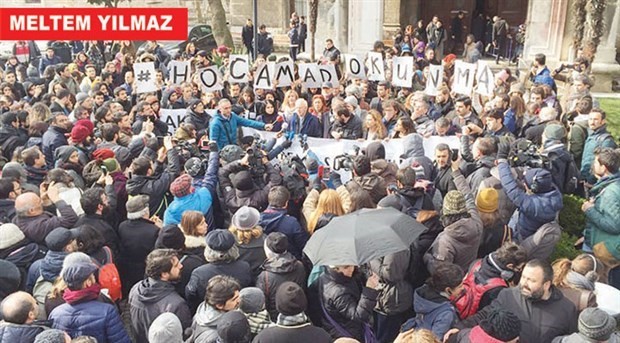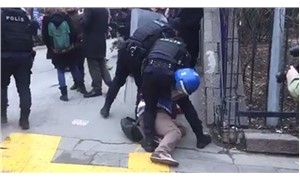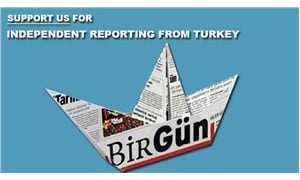BirGün interview with Prof. Vialon: Academia in Turkey under pressure

Interview Meltem Yılmaz/Martin Louis Vialon
Professor Martin Louis Vialon, who taught at Turkey’s Yeditepe University between the years 2000-2011, has extensive work on Jewish academicians that escaped from Nazi Germany.
As BirGün, we talked to him about academia in Turkey today and the situation where numerous academics in the country have been pressured, suspended and/or dismissed in reference to state of emergency law.
Underlining that “universities and schools are the seismographs and mirrors of a society”, Prof. Vialon pointed out the dark stages that Turkey is going through currently and said: “The current practice of expelling academics and school teachers pursue the intimidation and deterrence in order to suffocate critique and setting a warning example for those who potentially disagree with AKP’s policy. Nazis worked with the same strategy to capture intellectuals...”
Currently teaching at Carl von Ossietzky University, Prof. Vialon also compiled a selected writings of Erich Auerbach, which was published (in Turkish) by Turkey’s Metis Publications with the title of Yabanın Tuzlu Ekmeği.
What academic achievements did the German academics coming to Turkey have?
The achievement of German-Jewish scholars in Turkey was enormous in each discipline. Particularly, the transfer of knowledge concerned the fields of city planning and administration, architecture, medicine, dentistry, classical and modern philology, musicology, philosophy, zoology, physics, mathematics and law. Have a look into the series Üniversite Konferansları which was published between 1935 and 1944. There you can re-read many public lectures of the expelled scholars.
But here is a story behind it, which I would like to tell. The Weimar Republic, representing Germany’s first democracy, was fragile. Its picture of a faltering society reached the low point when the NSDAP and Hitler won the most votes during the November election in 1932. Based on the support of industrial, finance and agricultural capital as well as nationalistic-conservative and military powers, Hitler used the “Enabling Laws” to rule the Republic as a state of emergency. Appointed through Hindenburg as “Reichskanzler” (chancellor of the Reich) in January 1933, the Führer principle as enforced conformity (Gleichschaltung) was established because the Reichstag rejected its role as lawmaker. Afterwards the Reichstag fire of February 1933 was exploited by the Nazis to forbid the Social Democratic and Communist parties, to kill and to torture many of their members on the streets and into the early concentration camps. First Jewish academic victims were losing their positions at universities based on the so called law on “Wiederherstellung des Berufsbeamtentums” (The restoration of civil service with tenure) in April 1933.
Exactly during that time Turkish universities were renewed within the context of Atatürk’s Cultural Revolution. Their Westernization was structured after the Geneva educationalist Albert Malche, who was appointed by the Dar-ül-fünun at Istanbul in 1932. Outdating teaching methods were, according to the ideas of Reşit Galip, Turkish Minister of Education, to be replaced by discursive teaching and specifically foreign language learning. In July 1933, by ministerial edict, the Dar-ül-fünun at Istanbul was closed down, and renamed Istanbul Üniversitesi in August. Of the 240 academic staff members 157 were expelled from their positions.
There was now the opportunity for teachers dismissed in Nazi Germany to find a new sphere of activity. Malche contacted the “Notgemeinschaft deutscher Wissenschaftler im Ausland” (Emergency Association of German Scientist Abroad), founded in 1933 in Zurich, and organized by Philipp Schwartz, who had been expelled from Frankfurt. In cooperation with the Ministry of Education, more than 1000 people – scholars including their family members and assistants – were finding a relative secure haven in Turkey.
And, on the other side, what kind of solid developments did Turkey have in fields of science, arts, and by opening Turkey's doors to German academicians?
First of all, the international community of states, I think, must be very much thankful to Turkey’s rescue of so many persecuted people. Modern Turkey continued the practice of the early Ottoman Empire’s policy, when it opened the doors for the persecuted Sephardic Jews of Portugal and Spain in 1492, who were victims of the Jesuit inquisition. The overtaking of Jewish scholars and Nazi opponents through Atatürk’s ministerial administration can be valued ethically as a symbolic gesture of atonement regarding the crimes against the Armenian population, committed by the Young Turks between 1915 and 1916, and tolerated by their German Empire allied.
As I have mentioned above, the achievement of Turkish education by the expelled scholars was sustainable. I can just give some example from my area of the humanities. Nowadays, we can read many translations of novels, literary essays, biographies or monographs in Turkish language, which were published originally in German, French or English. This effort has to do with the philologists Leo Spitzer and Erich Auerbach, who educated young students like Minâ Urgan, Safinaz Duruman, Şara Sayın or Süheyla Bayrav during the thirties and forties. All of them became leading professors and were connected with Sabahattin Eyüboğlu, Ahmet Hamdi Tanpınar, Azra Erhart or philosophers and art historians such as Macit Gökberk and Mazhar Şevket Ipşiroğlu. Students of their intellectual circle such as Süheyla Artemel or Cevat Çapan became professors as well and inspired many generations of their own students to continue within the fields of philology, translation, cultural and theatre studies. Even the increase of publishing houses is connected to this brief history of the humanities in İstanbul.
At that time, were the academicians who came to Turkey satisfied with being in Turkey?
I think, they were happy to be rescued of not transported into the concentrations camps and gas chambers. In contrast to other exile countries like Switzerland, France, the UK and the USA, they have been welcomed in Turkey, received legal working contracts and duties to learn and to teach Turkish, to publish course books in Turkish and not making any kind of propaganda for a foreign country. In his correspondence, Auerbach says that he overcame his exile without having a bigger damage. But the emigrants were observed in the late thirties by Nazi administration (see the so called “Scurla-Report”, 1939) which tried to win more influence in order to install Nazi professors. The government was aware about this conspiracy and, I suppose, just one professor of German studies was employed for a short term.
Especially, the emigrant scholars were satisfied with teaching because the personal and intellectual ties between students and professors were very intensive and close. At the beginning of the reforms, all classes were very small, the material (books) rare and sometimes housing was primitive, too; but the learning atmosphere was warm and affectionate. I saw old photographs where professors like Spitzer and Auerbach going on sailing trips or walking tours together with their students.
How many of them have returned to their countries, and why?
More or less all scholars left, some of them very early, others later. Spitzer and the philosopher Hans Reichenbach received better job offers and left for universities in the USA in 1936. The majority stayed until the end of the war and left, and, either went to the USA or back to Germany. The reasons of leaving are related to anti-communist streams within right-wing Kemalist groups, the start of the Cold War and the increase of inflation and currency loss. Only the philologist, painter and poet Traugott Fuchs stayed in İstanbul until he died in 1997.
And, how did these academics’ escape impact the development of the country? In other words, how does this reflect in Germany's political, social, economic and cultural life in the long run?
During the Third Rich, all disciplines were contaminated with racial-völkisch ideology. The “Nuremberg trials” (Nov. 1945 until April 1949) and the Auschwitz trial in Frankfurt (1963 until 1965) demonstrated the singular dimension of the Holocaust but only very few Nazi criminals were condemned. The so called “re-education” of the Allies installed after May 1945 did not work in a long run. Most of former Nazis professors (members of the NSDAP) were accepted to continue teaching. Only a few Jewish academics were coming back, among them some prominent ones, such as Adorno, Horkheimer or Karl Löwith. The loss of Jewish scholars in 1933 caused an intellectual impoverishment which could not be replenished.
You are an academician who has worked in Turkey. How do you evaluate Turkey's academic environment? What do you think are the most important shortcomings in the academic fields of the country?
Yes, I taught more than a decade in İstanbul at a private university with more than 20.000 students, and I came with my private library of ca. 8.000 books in November 2000. If the surface of educational institutions is meant when you say “environment”, then, I saw very tempting places. But sometimes I discovered a contradiction between their attractive surface and its none-existing substantial contents. Mostly, the libraries are not stuffed enough with primary texts and international journals. Regarding the academic stuff, I observed partly arrogance, ignorance and narcissism as a product of the authoritarian character type who went through the process of total adaptation. Sometimes and everywhere you can find this type as a teacher. The practice of teaching is mostly frontal and not discursive. In my disciplines – literature and philosophy – the matter of hermeneutical text interpretation must be discursive. This Hegelian concept of historical relativism interprets a text in order to decipher its message for understanding its author, epoch and the present age. When working out its current meaning, it is necessary that no one controls or denounce you or your students’ efforts because the concept is related to the life of the interpret and its learner. One example: How can you interpret Kant’s ideas of enlightenment as his concept of “sapere aude” (use your own reason) by rejecting politics? It is impossible because the current reality in Turkey is present within this text as diametrically opposite. Science and philosophy have not the task to paint a false picture of reality because this would be a lie.
The students were extremely interested, snoopy, sweet, smart, very polite and curious concerning all offered classical contents. But from their experience at school, they are not trained to read between 3 or 5 hours per day. This is not a problem in Turkey only: since the digital revolution, it takes place everywhere around the globe. The dominating mode of learning is based unilateral on visualization. The negative result is that individual’s abilities of combinatorial and imaginative ways of thinking are artificially abridged.
Today in Turkey, many academicians are being expelled from their posts. Some go abroad. This picture is analogous to the situation of academics who had escaped from Nazi persecution. When you make a comparison, do you see such a similarity?
Of course, there exists a structural parallel to the epoch of Nazi Fascism. I would suggest that the current historical process is a revenge of the AKP’s government against Kemalist educational reforms and its ministerial compelled displacements of old fashioned scholars in 1933. But the expelled and arrested colleagues of today are persecuted because of signing a “Piece petition” or accused as being members of FETÖ. However, the Kafkaesque and arbitrary displacements of academics have no legal basis compared with the ministerial modernized Dar-ül-fünun. Instead, the ministry of Higher Education (YÖK, it is product of the military coup d’etat of Sept. 1980) should protest because it has the duty of welfare regarding its academic staff. The current practice of expelling academics and school teachers pursue the intimidation and deterrence in order to suffocate critique and setting a warning example for those who potentially disagree with AKP’s policy. Nazis worked with the same strategy to capture intellectuals like the name giver of my university – Carl von Ossietzky – a writer, journalist and communist, who protested against slaughtering freedom. He received the Nobel Price for Peace retroactive in 1936, was tortured in the concentration camp of Esterwegen and died in 1938. In this historical context, one other thinker, the great Blaise Pascal, has to say something to us. His fragment 298 of the Pensées (Thoughts, 1657) comes to my mind: “Justice without power is helpless; power without justice is tyrannical.” With these words you have a dialectical explanation of the emergency situation in Turkey.
How do you think the dismissals in Turkey will impact progress and developments in the country?
Universities and schools are the seismographs and mirrors of a society. If they lose reputation because of political paternalism and manipulation, then the academic freedom is destroyed. A brain drain is one consequence of persecution because the best connected intellectual heads leaving their country. This implies that positive identification figures cannot reproduce students as potential teachers, professors or responsible members of the society any longer. Traditions are interrupted and disciplines disappeared from the agenda. Mediocre as uncritical joke figures replace former unique and remarkable professors.
What do you think are the basic needs of academia in Turkey today?
I just have some minimal humanistic wishes as such: 1.) At each high school Ahmet Hamdi Tanpinar’s novel Huzur (1949) should be read as obligatory because you can learn discursive storytelling, argumentation and about the emancipation of women. 2.) Reflect about the problem: Who educates the educators? 3.) Do not just repeat teachers or professors’ opinions like a parrot, because, finding truths happens as a reciprocally process. 4.) Recognizing and rejecting dogmas, and learn to say “No” as to disagree with comprehensible reasons. 5.) Study the holy and poetical script of the Quran in a historical-critical way as searching for its Babylonian, ancient Greek and Stoic philosophical and biblical implications, and make a modern interpretation as demonstrating the Wahhabis falsifications. 6.) Try to learn that an intellectual is an independent figure who doesn’t need religious revelation or a political god to show rational argumentation.
Lastly, does the latest situation surrounding academia in Turkey mostly get considered as an indication that the country is going backwards on freedoms? How is this really viewed from outside?
The current time is certainly very dark. It seems to be doing steps back into the late Ottoman period as an age of imperial restoration, war and violence. The division power is factually abolished, the human rights ignored, and constitutionality doesn’t exist. Please, let me quote what I published in July 2003: “Erdoğan’s policy […] can be described as a policy which tries to establish democratic reforms, but with the ideological implication and tendency of reactionary policies, namely to bring the superstructure of the society under the domination and control of an anti-enlightened, anti-intellectual and non-secularized content, which means that the principles of democracy, liberation, freedom and human emancipation can be abolished step by step through the new political majority of the AKP in the Turkish parliament.” (Yeditepe’de Felsefe 2, 2003, S. 192)
The course of history went in that direction: No normalization of the political life can be seen. AKP destroys liberal education and calculates the modification of the superstructure and it’s turning into an Islamic poster. Witch-hunting and inventions of criminal acts against opponent people manifests that the breach of the laws is obvious. Today, and in the near future, only Turks themselves can repair their self-produced damage. But so long as no process of reconciliation between government and the Kurds is not in sight, Turkey will fall deeper again and again. Particularly, the so called opposition of CHP should ultimately do its substantial homework to separate its politics from bilgy ethnical ideology: Self-critical auto-purification of individuals and institutions is the only hope for those who are hopeless. However, the ultimate ratio should come to the human point of dignity: Free speech for all people and freedom for all persecuted journalists and academics.





